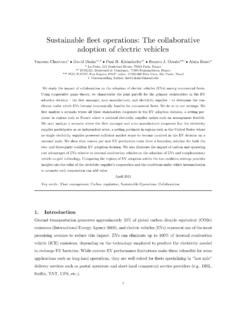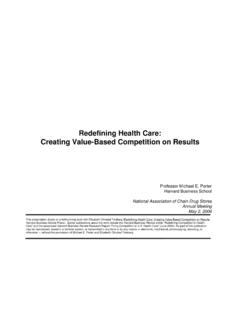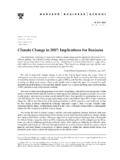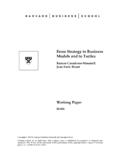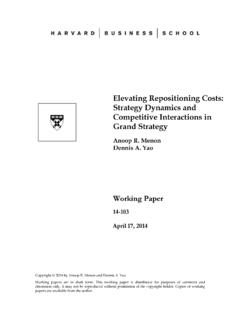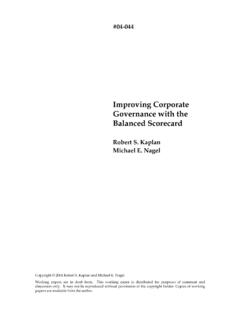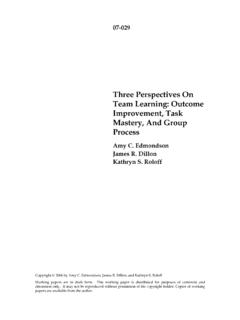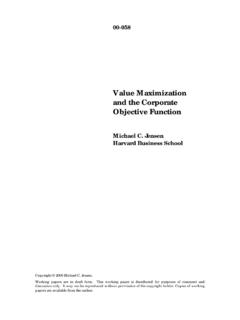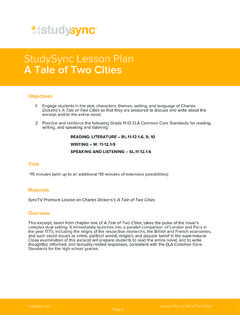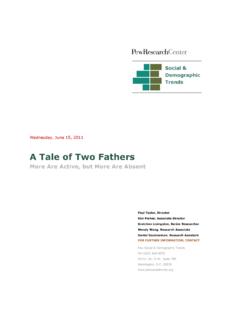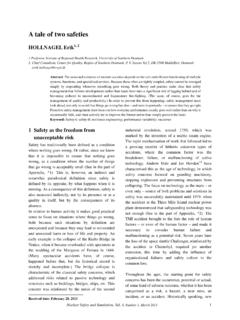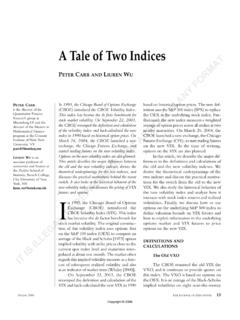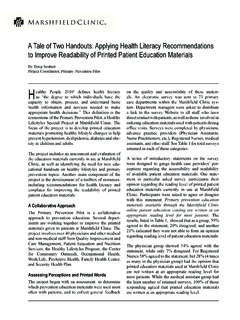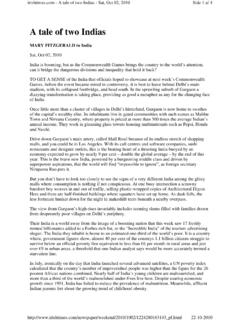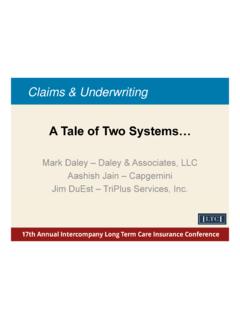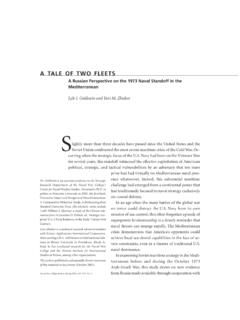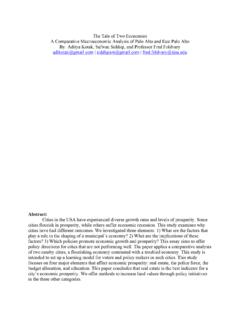Transcription of A Tale of Two Stories: Sustainability and the …
1 66 Journal of Applied Corporate Finance Volume 25 Number 3 Summer 2013A Tale of Two stories : Sustainability and the quarterly earnings Call1. The authors would like to thank Andrew Knauer, Research Associate and Barbara Esty, Senior Information Research Specialist, both at the Harvard Business School, for their diligent research support for this article. They would also like to thank the UN Global Compact, especially Sarah Bostwick and Naoko Kimura, and the Principles for Responsible Investment, especially Danielle Chesebrough and Titia Sjenitzer, for data and comments. As usual, Don Chew provided valuable input and was instrumental in helping us produce this article on Accenture and UN Global Compact, A New Era of Sustainability CEO Study 2010, June 2012.
2 , accessed August 25, 2013. The survey included both interviews and an online survey. Fifty interviews were conducted with CEOs, chairper-sons, and presidents of UN Global Compact participant companies and an additional 50 interviews were conducted with other senior business executives, civil society leaders, and external experts and UN Global Compact board members. The online survey in-cluded 766 Global Compact participant CEOs. Survey and interview respondents repre-sented a large diversity of both countries and industries. 3. MIT Sloan Management Review in collaboration with The Boston Consulting Group, The Innovation Bottom Line, Winter 2013. The analysis includes a sample of 2,600 respondents from commercial enterprises, with respondents from academic, governmental, and nonprofit organizations excluded.
3 The respondents are based around the world, with a wide variety of industries represented. The sample is drawn from a number of sources, including MIT alumni, MIT Sloan Management Review Subscribers, and BCG clients. Interviews with practitioners and experts were also conducted, which provided case studies to illustrate the survey results. 4. Competitive forces were seen as very important 60% pursuing Sustainability strategies felt that this was necessary to be competitive, another 31% said it wasn t now but would be in the future, and only 5% said Sustainability was not important for com-petitiveness. Sixty-two percent of the respondents felt that their CEO had a strong com-mitment to Sustainability .
4 The perceived importance of Sustainability was also increasing, with 63% responding that their organization s commitment had increased significantly or somewhat (70% expected it to increase in the next year), 29% cited no change (24% expected no change in the next year) and only 3% cited a somewhat or significant de-crease (2% expected decrease in the next year). In light of this, it follows that about one-half of respondents (48%) said their company s business model had changed as a result of Sustainability . by Robert G. Eccles and George Serafeim, Harvard Business School1 SThe Rise of Sustainabilityustainability has become part of the business lexicon. It is now a common, yet still often controversial, term.
5 Its meaning is also not well-defined. We define Sustainability in terms of a company s strategy and the relationship between this strategy and the society that grants companies their license to operate. A sustainable strategy is one that enables a company to create value for its sharehold-ers, while at the same time contributing to a sustainable society. A sustainable society is one that meets the needs of the current generation without sacrificing the needs of future generations. The responsible management of natural resources and human capital is clearly an important part of this mission. For this reason, a sustainable strategy is one that aims to minimize the negative effects of a company s operations and activities on the environment and local communities effects often referred to by economists as externalities without significant losses in productivity and value creation.
6 For companies to accomplish all this, the challenge is to integrate the material Sustainability issues for their sector into the core of their operations. Viewed in this way, Sustainability is more than a program; it is a critical part of a firm s this end, many companies with long planning horizons are likely to find it in their shareholders interests to make investments that are above and beyond what law and regulation require as it responds to changing social expectations expec-tations that often prove to be precursors of future regulation. These investments will not necessarily pay off over the short term, can have a high degree of uncertainty, and their ultimate value depends upon future states of the world that cannot be suggest that corporate executives are increas-ingly interested in Sustainability .
7 A 2010 survey conducted by Accenture and the UN Global Compact (Accenture/Global Compact) on Sustainability strategies found that 96% of the responding CEOs believed that Sustainability issues should be fully integrated into the strategy and operations of the company (up from 72% in 2007) and that 81% claimed they were doing so. Ninety-three percent of the CEOs said they believed that Sustainability issues will be critical to the future success of their business. And an equal percentage felt that boards should discuss and act on Sustainability issues, and 75% said they believed their boards were doing Evidence in support of the perceived importance of sustain-ability by executives was also provided by a 2012 survey on innovation and Sustainability by the MIT Sloan Management Review in collaboration with The Boston Consulting Group (MIT/BCG).
8 3 When asked which issues executives associated with Sustainability , the most common response (63%) was the economic Sustainability of the organization, followed by environmental issues (62%), corporate social responsibility issues (61%), and increased emphasis on a long-term perspec-tive (53%).4 At the same time, however, the survey also found that making the business case for Sustainability is not an easy thing to do. Only 38% of respondents said they thought they had succeeded in doing this, while 32% said they had not, and 15% said they had tried but it was too difficult (the remaining 25% were unsure). These findings were similar in terms of assessing 67 Journal of Applied Corporate Finance Volume 25 Number 3 Summer 20135.
9 A strong relationship exists between having a business case and profit impact. Fully 60% who reported having a business case said the profit impact was positive, versus 20% for those who do not. There was also a relationship between the number of elements in the company s business model that had changed and having a positive profit impact from Sustainability . Out of a total of six business model elements (product/service offering, value chain processes, organizational structure, cost model, target seg-ments, and revenue model), when only one or two elements were changed the percent reporting a positive profit impact was 37 and 40, respectively. This number rose to 55% when five or six elements were changed.
10 It was even higher, 59%, when three or four elements were changed but two of them included target segments and value chain pro-cesses, clearly illustrating the importance of customers and suppliers in getting positive financial results from Sustainability . 6. The Accenture/ Global Compact survey found that 34% of CEOs (up from 26% in 2007) believed that the lack of recognition from the financial markets is a barrier to in-tegrating environmental, social, and governance issues into the strategy of the company. 7. Thirty percent of the CEOs in the Accenture/UN Global Compact survey acknowl-edged a failure to recognize a link between Sustainability and the company s value driv-ers. 8. United Nations Global Compact, Overview of the UN Global Compact.
